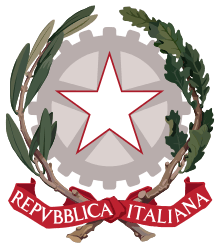Tambroni Cabinet
The Tambroni Cabinet was the cabinet of the government of Italy from 25 March 1960 to 26 July 1960. The government only received the necessary vote of confidence from the parliament, thanks to the votes of the fascist Italian Social Movement and the Monarchists.[1] His brief government was hardly citicized by the Italian lefts.[1][2]
Prime Minister Fernando Tambroni was a prominent advocate of law and order policies. He is mostly remembered for his resignation caused by the Genoa riots of 1960.
Ferruccio Parri held an anti-fascist talk in during a demonstration on July 19, two days after Tambroni's resignation.[3][4]
Its Minister of Culture Umberto Tupini attacked Federico Fellini's La Dolce Vita, announcing that all the "shameful films" would soon be banned.[5]
The 1960 Summer Olympics were to be held in Rome from August 25. Italy had been admitted to the United Nations in December 1955, and in 1960, international public opinion was still aware of the shadow of Italy's fascist past. Historian Gianpasquale Santomassimo said that if the games had been held under a government of fascists and filo-fascists, it would have been a catastrophic impact on Italy's image.[6]
Notes
- 1 2 Ginsborg (1990) pp.256-7
- ↑ il Manifesto, July 4, 2010, p.3 TAMBRONI: Un dc «borghese, maschio, virile, antimarxista quote:
L'onorevole Tambroni appartiene a quella borghesia maschia e virile che si affaccia sui problemi sociali e politici senza infingimenti, ma soprattutto senza paura. È un lavoratore efficiente e metodico in un mondo di pigri, un solutore di problemi legislativi, un difensore strenuo e implacabile di quella invalicabile linea che distingue la nostra etica politica dal marxismo della estrema sinistra
- ↑ P. G. Murgia Il luglio 1960, Sugar edizioni»
- ↑ CRONOLOGIA: L'avventura dc e nera del governo Tambroni, il Manifesto, July 4th 2010, p.2
- ↑ AA.VV., (1945-1994) Italia/Storia della prima repubblica: La politica, la società, i protagonisti, le date cit., p 134
- ↑ Gianpasquale Santomassimo (2010) Magliette a strisce, il Manifesto, July 4th 2010. quoote:
Poco meno di due mesi dopo, le Olimpiadi di Roma ... rappresentarono la prima grande vetrina internazionale dell'Italia repubblicana, da poco ammessa nelle Nazioni Unite. Rimossa dall'Italia «moderata» e «benpensante», l'ombra del passato fascista era ancora ben presente presso l'opinione pubblica internazionale. Arrivare a questo appuntamento con un governo di fascisti e filofascisti sarebbe stato semplicemente catastrofico per la nostra immagine.
Sources
- Ginsborg, Paul (1990). A History of Contemporary Italy: Society and Politics, 1943-1988. External link in
|title=(help)
External links
- Il Governo Tambroni - minister list on the Official website of the Italian government
- Alessandra Fava In migliaia a Genova per ricordare la rivolta antifascista
